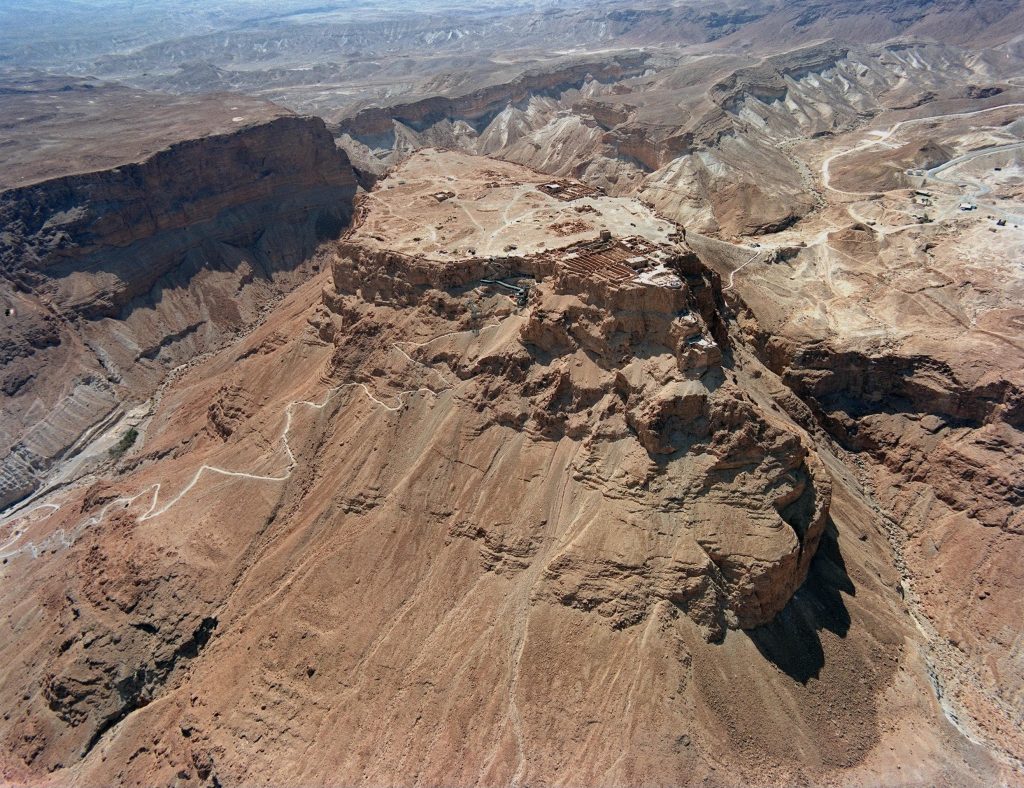Masada was an impressive fortress built upon a plateau to protect Jewish Zealots and refugees from the Romans. The Jews wisely chose this location because of its natural defenses against invaders. They imagined it would be impossible for anyone to besiege the city; the treacherous terrain and great outer wall surrounding Masada surely would protect it. Unfortunately, the Jews underestimated the Roman army.

Masada appeared to be the perfect fortress. Its four vertical sides made it nearly impossible to invade. The largest wall on the eastern side is one hundred forty meters above the desert floor, roughly half the size of the Eiffel Tower. From the east, there is a dangerous zig-zagging trail called the serpent’s path. The western side wall is eighty meters above the desert floor, as tall as the Statue of Liberty. The inhabitants took the extra precaution and built two walls on the perimeter of the plateau about 1400 meters long and six meters tall. The outer wall was 1.4 meters thick and the inner was 1 meter thick. Between the inner and outer wall, there was an empty space. During an invasion they planned to fill the gap with stone, wood, and dirt to strengthen the wall; until then it was used for storage. There were also twenty-meter-tall towers strategically spaced out throughout Masada for defensive reasons.1
The defenders were aware that if one were to attack, the first action the enemy would take would be to stop the water supply. Anticipating that possibility, the defenders built twelve cisterns to hold the water inside the fortress. Along the western slopes they had enough water stored to fill sixteen Olympic pools. It was very forward thinking of the Jews to do this. They also had many food storehouses toward the north. They kept grain, oils, corn, wine, dates, along with other foods. Thanks to the dry climate, storing the food was not a problem. In case they were to run low, the flat land would be ideal to grow additional food. Remains of the wall, tower, cisterns, food storage buildings, and other structures are still visible today.1

Unfortunately, these precautions were no match for the Roman army. In 73 C.E., Flavius Silva marched the Roman army and other troops totaling about 10,000 soldiers south to conquer Masada. Waiting on top of Masada were the 1,000 men (Jewish refugees and Zealots) willing to defend their safe haven. The Romans were aware it would take a significant amount of time to destroy Masada, so they set up camp and had Jewish war prisoners bring a constant supply of food and water. They first stopped up the aqueducts and diverted them for their own use. Next, they constructed a wall around Masada to prevent the inhabitants from escaping, and to cut them off from the outside world, a classic Roman war operation. The wall was three meters high and 3.2 kilometers long, and enforced by eight camps with many other guards posted. This impressive mechanism was built in a matter of days and can still be seen today.1

The Romans knew this would not be a quick victory; they would have to overthrow Masada by force. They came to the conclusion that the only way to reach the top of Masada was by making the steep side into a gradual incline. To do this, they took advantage of a natural spur called the white rock on the western side. It was nearly two hundred meters from the top of Masada to the edge of the natural gulf. The ramp to the top was built at a twenty degree incline. It took months to build the massive ramp. Every day, the inhabitants of Masada would wake up to see the enemy growing closer and closer, with no way for them to escape. As the Romans got close to the top, they became more vulnerable to the defenders. The Jews at the top could now shoot arrows and defend themselves against the Romans. As a result, the Romans had the Jewish war prisoners shield them so that they could shoot back. Within two months, the great ramp was complete. It was two hundred twenty meters long, and archaeologists assume it weighed as much as one and a half empire state buildings.4
The Romans attacked Masada with their siege towers. They rolled the massive towers up the man-made ramp to overthrow Masada. The inhabitants tried to fight back, shooting arrows at the towers and trying to destroy it with fire.4 The day before the final attack, the Romans carefully planned how they would conquer Masada. Early that morning, they charged up the ramp, and over the walls. To their surprise, they were not met with a fight. Instead, they encountered thousands of dead bodies. The few remaining women and children explained to them what had happened. The Jews knew they did not stand a chance against the Roman army of 10,000. They decided it would be better to die than to be conquered. Since Judaism does not allow suicide, they came to the conclusion they would have to kill each other. The men first killed the children and women; then they cast lots to decide who would be killed first, and who would have to be the last to commit suicide. It is ironic how they ignored the sixth commandment not to murder, but decided to alter its meaning to mean not to murder yourself. Despite the confusion, they ultimately chose death over slavery.6
- Encyclopedia Judea, 2007, s.v. “Masada,” by Michael Berenbaum. ↵
- Encyclopedia Judea, 2007, s.v. “Masada,” by Michael Berenbaum. ↵
- Encyclopedia Judea, 2007, s.v. “Masada,” by Michael Berenbaum. ↵
- The Greenhaven Encyclopedia of the Ancient World, 2002, s.v. “Siege of Masada,” by Don Nardo. ↵
- The Greenhaven Encyclopedia of the Ancient World, 2002, s.v. “Siege of Masada,” by Don Nardo. ↵
- Encyclopedia of Death & Human Experiences, 2009, s.v. “Mass Suicide,” by Clifton D. Bryant. ↵



86 comments
Edward Cerna
I had never heard of this story before and I am glad I found it on this site. This has to be one of the most interesting stories on here. I was expecting this huge fight between the Romans and the Jews but was surprised when I read that they had all murdered each other. That was most surprising to me because like you said it is kind of ironic how “they ignored the sixth commandment not to murder but they decided to alter its meaning to mean not to murder yourself. “
Rebekah Esquivel
At first I had a hard time keeping focus to the article. It was kind of a lot of information compacted at once. However, once I kept reading I was interested in the article. That is very surprising how they decided to kill themselves instead of be conquered by the Romans. I also find it very shocking on how they decided to kill themselves. Instead of all committing suicide they created a strategy and order on who was going to kill who. This must have been very tragic for these people in their final hours and it was actually a bit sad to read.
Briana Myers
I was not aware of this particular moment in history and I am very surprised by it. It is incredible to think about the numerous dead bodies that the Romans must have seen. I was impressed to learn how the Jews created that fortress of theirs in order to protect themselves from the Romans. However, the Romans were too powerful to be stopped by the walls of Masada. It must have been horrible for the Jews to decide to kill each other just to avoid being killed by the Romans.
Alejandra Mendez
I had never heard of this before and am glad I know about it now. I find it astonishing that because they were so prideful and refused to be conquered, they amounted to killing each other. It is somewhat heroic, but as mentioned in the article, they did seem to completely ignore the commandment stating they should not kill. Perhaps they believed that suicide was a harsher punishment than murder and that they would be forgiven due to their circumstances? This was an overall interesting article and although it ended tragically for the Jews, I admire their intelligence for building their own little fortress and defending themselves while they could.
Manuel Aguilera
Granted it was a rather vicious article, I enjoyed reading it. I find it interesting what some people would do in times of crisis or when measures become desperate, the fact that they were willing to change their own beliefs to escape the fear that they too would either be killed or turned into war prisoners. Prior to reading the article, I had understood that the Romans were very good at conquering cities but I did not know Masada was one of those cities. Also, I never considered just how smart the Romans were especially when it came to war, they were thinking not only of creative solutions to their problems, but solutions for problems to come.
Alexis Renteria
What a major plot twist. The way this article was written, leads the reader to believe that there is going to be a really intense battle between the Jews and the Romans. For example, the way you described the strategies of the Romans and how they built their own wall, and how they made a ramp just to conquer the land of the Jews. Overall this was a great article, informing the reader about an unexpected event and adding irony to the massive suicide of Masada.
Karina Nanez
Before reading this I had never known of the city Masada, and the beginning of this article does a fantastic job of describing all the different fortifications and protections the Jewish Zealots took in order to be safe from the Romans. I was amazed to read of all the food and water storage they had prepared in anticipation of the Romans favorite war tactic. And I was even more impressed to read of their mass suicide in order to avoid slavery.
Clarissa Bustamante
It was very interesting reading about two of the oldest military tactics and their ethnic groups; Romans and Jews. It was great how you incorporated both tactics from each ethnic group from before and after the war. I was most definitely surprised by the Jews last final act of escape. Also I wonder if all the resources and supplies they were using towards the campaign were all that great. Overall it was great how you describe it from each of the groups.
Valeria Hernandez
It is always amazing to learn something new, therefore I was especially excited to hear about the subject. The intelligence and military tactics of the Roman empire were impressive, but the bravery of the Jews. The Roman empire was insightful, but the Jewish were courageous as they would rather die than become slaves. The author Jennifer Pogue explains the story without displaying judgment she was able to describe a historical event.
Cameron Ramirez
I had no clue about the mass suicide of Masada let alone where and when it happened. I can’t imagine what it must have been like to see friends and family murder themselves. I found your article very interesting and informative. I liked the information about the sizes of the walls and the comparison to our current building sizes like the Eiffel Tower. I also enjoyed the how descriptive you were when came to describing Masada. Great job!